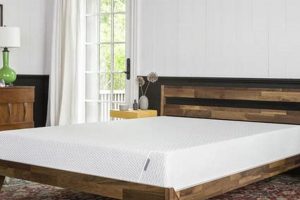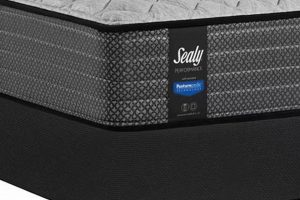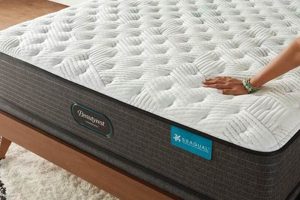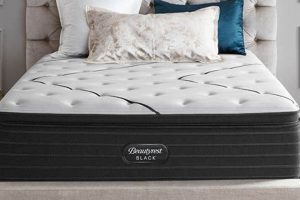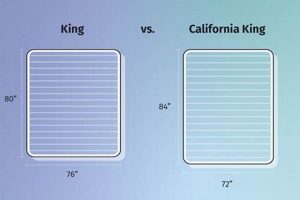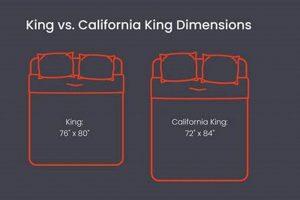A 72 x 80 inch mattress is a sleeping surface specifically designed to fit within the confines of a recreational vehicle (RV). This particular size, often referred to as an RV King, offers a compromise between the spaciousness of a standard King and the spatial limitations inherent in RV design. This RV King size provides additional width and length compared to a standard RV Queen, enhancing sleep comfort for occupants.
The utilization of this specific mattress dimension can significantly improve the sleeping experience during travel. A larger sleeping surface facilitates greater freedom of movement, potentially reducing sleep disturbances and improving overall rest quality. Historically, RV mattresses were often thinner and of lower quality than residential mattresses. However, advancements in manufacturing and material science have led to the availability of high-quality options specifically tailored for the RV market, addressing comfort and durability concerns.
Further discussions will delve into the various materials used in construction, considerations for weight and space within the RV, and the different types of support systems available for this specialized bedding option. Topics will include memory foam, innerspring, and hybrid models, as well as considerations for breathability, hypoallergenic properties, and overall suitability for the RV environment.
Considerations for Selecting a 72 x 80 RV King Mattress
Selecting the appropriate sleeping surface for an RV requires careful consideration of factors beyond standard residential needs. Space constraints, weight limitations, and environmental conditions within the RV necessitate a focused approach.
Tip 1: Measure Available Space Accurately: Prior to purchase, meticulously measure the designated sleeping area within the RV. Confirm the dimensions accommodate the mattress without compromising walkways or other essential functions.
Tip 2: Prioritize Weight Management: RVs have strict weight limits. Lighter materials, such as certain foam constructions, can help avoid exceeding these limits, improving fuel efficiency and handling.
Tip 3: Evaluate Mattress Thickness: Thicker mattresses may offer enhanced comfort, but can also reduce headroom, especially in RVs with lower ceilings. Balance comfort with spatial considerations.
Tip 4: Examine Material Breathability: RVs can experience fluctuations in temperature and humidity. Breathable materials, such as open-cell foam or mattresses with ventilation channels, mitigate heat retention and moisture buildup.
Tip 5: Assess Support Requirements: Consider individual sleep preferences and physical needs. Options range from firmer innerspring mattresses to conforming memory foam, each offering different levels of support.
Tip 6: Consider Motion Isolation: For couples, mattresses with good motion isolation minimize sleep disturbances caused by movement during the night.
Tip 7: Research Mattress Durability: RV travel can subject mattresses to vibrations and potential shifting. Opt for mattresses constructed with durable materials and reinforced edges.
Careful attention to these factors ensures the chosen mattress provides optimal comfort, promotes restful sleep, and integrates seamlessly into the RV environment.
The following sections will provide detailed comparisons of available mattress types and technologies suitable for RV applications.
1. Dimensions & RV Fit
The relationship between specific dimensions and the overall fit within a recreational vehicle is paramount. Mismatched sizes can compromise functionality and comfort, emphasizing the critical need for precise measurements and product specifications, especially when considering a 72 x 80 RV King mattress.
- Precise Measurement Verification
Accurate measurement of the RV’s designated sleeping area is the first step. Interior wall dimensions can vary slightly from stated floor plans. Failure to verify measurements can lead to the selection of a mattress that either does not fit or requires modification, resulting in additional expense and potential damage to the RV’s interior.
- Allowance for Obstructions
RV sleeping areas often contain wheel wells, cabinets, or other built-in features that intrude upon the available space. When determining the suitability of a 72 x 80 RV King mattress, allowances must be made for these obstructions. Ignoring these elements can result in a mattress that partially blocks access to storage compartments or interferes with slide-out mechanisms.
- Clearance for Movement
Even if the mattress physically fits within the RV, sufficient clearance for movement around the bed is essential. A 72 x 80 RV King mattress consumes a significant portion of the available space. Reduced clearance can create a cramped environment, hindering accessibility to other areas within the RV, such as closets, bathrooms, or entryways.
- Impact on Weight Distribution
While not directly related to physical dimensions, the weight of a 72 x 80 RV King mattress contributes to the overall weight distribution within the RV. Improper weight distribution affects handling and fuel efficiency. Selecting a lighter-weight mattress option within the 72 x 80 size category mitigates these concerns.
These dimensional and fit considerations underscore the importance of thorough assessment before purchasing a 72 x 80 RV King mattress. A well-fitted mattress enhances the overall RV experience by maximizing comfort and usability. Conversely, a poorly chosen mattress can lead to spatial constraints, access limitations, and potential safety hazards. Selecting the best mattress option requires attention to every element.
2. Weight Considerations
The weight of a 72 x 80 RV King mattress exerts a direct influence on several critical aspects of RV operation. Excessive weight negatively impacts fuel efficiency, places undue stress on suspension components, and can compromise the vehicle’s overall stability, thereby increasing the risk of accidents. Choosing a lighter mattress within this size category is therefore essential for maintaining optimal RV performance. For example, a heavier innerspring mattress might provide enhanced support but could add several hundred pounds to the RV’s overall weight, whereas a foam mattress, while potentially offering less support, presents a lighter alternative.
Beyond the immediate effects on vehicle mechanics, weight considerations also play a role in compliance with legal regulations. Many jurisdictions impose weight restrictions on vehicles, and exceeding these limits can result in fines or the inability to operate the RV legally. A 72 x 80 RV King mattress, due to its size, already contributes
a significant amount of weight. Selecting materials with lower densities, such as lightweight memory foam or hybrid constructions, allows for a larger mattress without significantly increasing the overall burden. Understanding the weight limitations of the specific RV model and carefully researching the weight specifications of various mattress options is paramount to safe and legal operation.
In summary, the weight of a 72 x 80 RV King mattress represents a critical design factor. Choosing a mattress necessitates balancing comfort and support with the imperative of minimizing weight. Addressing this challenge requires careful assessment of material properties, construction methods, and the RV’s specific weight capacity. Prioritizing weight considerations contributes to improved fuel economy, enhanced handling, increased safety, and compliance with relevant regulations, and ultimately contributes to a better RV travel experience.
3. Material Durability
The longevity and performance of a 72 x 80 RV King mattress are intrinsically linked to the durability of its constituent materials. The demanding environment within a recreational vehicle, characterized by frequent movement, temperature fluctuations, and potential humidity, necessitates materials capable of withstanding significant stress and wear. The choice of materials directly impacts the mattress’s resistance to sagging, tearing, and the breakdown of structural integrity. For example, a mattress utilizing low-density foam is likely to degrade more rapidly compared to one constructed with high-density foam, resulting in a shorter lifespan and diminished support. Similarly, the quality of the mattress cover material determines its resistance to abrasion and staining, directly influencing its long-term aesthetic appeal and hygiene.
The selection of durable materials extends beyond simply extending the mattress’s lifespan; it directly affects comfort and safety. A mattress exhibiting premature material failure can develop uneven surfaces, creating pressure points that disrupt sleep and potentially exacerbate existing physical ailments. Compromised structural integrity can also lead to safety concerns, particularly if the mattress is used in conjunction with adjustable bed frames or platforms within the RV. Furthermore, the off-gassing potential of certain materials, particularly synthetic foams, is amplified by prolonged exposure to heat and humidity, potentially affecting air quality within the confined space of an RV. Therefore, certifications such as CertiPUR-US, which attest to low VOC emissions and material safety, become particularly relevant in the RV context.
In conclusion, material durability is not merely a cosmetic concern for a 72 x 80 RV King mattress; it represents a fundamental determinant of its functionality, comfort, and safety. Investing in a mattress constructed with robust, high-quality materials offers significant long-term benefits, mitigating the risk of premature failure, maintaining consistent support, and ensuring a healthier sleep environment within the demanding conditions of recreational vehicle travel. The enhanced durability also means fewer replacements, creating a more sustainable and cost-effective solution over the long term.
4. Comfort Preferences
The integration of comfort preferences into the selection process for a 72 x 80 RV King mattress directly affects the quality of rest experienced by RV occupants. Individuals possess unique requirements based on factors such as sleeping position, body weight, and existing musculoskeletal conditions. These preferences dictate the optimal firmness, support, and material composition of the mattress. For instance, a side sleeper might prioritize a softer surface to alleviate pressure on the shoulders and hips, whereas a back sleeper may benefit from a firmer mattress that maintains spinal alignment. Neglecting these personalized needs can lead to sleep disturbances, discomfort, and potentially exacerbate pre-existing physical issues, thus diminishing the overall travel experience. A practical example of this is an individual with chronic back pain who selects an inappropriately soft mattress, leading to increased pain and reduced sleep quality during their RV journey.
The interplay between comfort preferences and mattress selection extends beyond simple firmness considerations. Material properties such as breathability and motion isolation also play significant roles. Individuals who tend to sleep hot may benefit from mattresses incorporating cooling technologies, such as gel-infused memory foam or open-cell foam structures, to regulate temperature and minimize discomfort. Similarly, couples sharing a 72 x 80 RV King mattress may prioritize motion isolation to reduce sleep disturbances caused by movement. Mattress constructions that effectively minimize motion transfer prevent one partner’s movements from affecting the other’s sleep. Understanding these nuances allows for a more informed decision, aligning the mattress characteristics with specific comfort requirements and lifestyle factors.
In summary, recognizing and prioritizing comfort preferences represents a critical step in selecting a 72 x 80 RV King mattress. The failure to address these individual needs can significantly compromise sleep quality and overall well-being during RV travel. By carefully considering sleeping position, support requirements, material properties, and personal sensitivities, individuals can optimize their mattress selection, transforming their RV sleeping space into a comfortable and restorative environment. Overcoming the challenges posed by limited space and unique environmental conditions requires a deliberate focus on personalized comfort to ensure a positive and healthful travel experience.
5. Space Optimization
The integration of a 72 x 80 RV King mattress into the limited confines of a recreational vehicle inherently necessitates a focus on space optimization. The size of the mattress, while offering enhanced sleeping comfort, presents a spatial challenge that requires careful consideration of the surrounding environment. A poorly planned installation can impede movement, obstruct access to storage compartments, and diminish the overall functionality of the RV. For instance, selecting a mattress with excessive thickness can reduce headroom, making it difficult to sit upright in bed. Similarly, insufficient clearance around the perimeter of the mattress can restrict access to closets, drawers, or other essential amenities. The efficient utilization of space, therefore, becomes a critical design element when incorporating this particular mattress size into an RV layout.
Effective space optimization strategies in this context involve a multifaceted approach. Initially, precise measurements of the designated sleeping area are paramount to ensure the mattress fits without compromising walkways or obstructing other essential features. Furthermore, the selection of a mattress foundation or platform should prioritize space-saving designs, such as integrated storage drawers or lift-up mechanisms. Material choices also influence space efficiency; lighter materials reduce the overall weight burden, enabling the RV to carry more essential cargo without exceeding weight limits. Real-world examples i
llustrate the importance of these considerations. RV owners frequently employ custom-built platforms with integrated storage to maximize utility beneath the mattress, effectively repurposing otherwise unused space. The careful selection of bedding and linens that can be easily compressed and stored further contributes to the overall space efficiency within the RV. A well-optimized sleeping area enhances comfort and functionality, transforming a potentially cramped space into a comfortable and efficient living area.
In summary, space optimization is an indispensable component of successfully integrating a 72 x 80 RV King mattress into a recreational vehicle. This entails a holistic approach that considers mattress dimensions, foundation design, material selection, and the surrounding environment. Overcoming the challenges posed by limited space requires careful planning and attention to detail. By prioritizing space efficiency, RV owners can maximize comfort, functionality, and overall enjoyment of their mobile living space. Addressing the inherent spatial constraints of the RV environment ensures that the benefits of a larger mattress are not offset by a compromised living experience. Therefore, a focus on strategic space utilization transforms the 72 x 80 RV King mattress from a potential space constraint into a comfortable and integrated element of the RV’s design.
6. Support System
The support system within a 72 x 80 RV King mattress is a critical determinant of its overall performance and suitability for use. A mattress’s support system directly influences spinal alignment, pressure distribution, and the prevention of sagging, all of which are paramount for a comfortable and healthy sleep experience, particularly within the space constraints of a recreational vehicle. The choice of support systembe it innerspring coils, foam cores, or hybrid constructionsdictates the mattress’s ability to provide adequate support for individuals of varying weights and sleeping positions. An inadequate support system results in uneven weight distribution, leading to pressure points and potential discomfort, while a well-designed system promotes proper spinal alignment, minimizing the risk of back pain and other musculoskeletal issues. For example, an RV traveler with a pre-existing back condition would experience significantly greater discomfort on a mattress with a weak or sagging support system compared to one with a robust and evenly distributed support structure.
The practical implications of selecting the appropriate support system extend beyond immediate comfort considerations. A well-designed system enhances the longevity of the 72 x 80 RV King mattress, preventing premature sagging and maintaining consistent support over time. This is particularly important in RV applications, where mattresses are subjected to frequent movement and potential variations in temperature and humidity. Furthermore, the support system directly impacts the effectiveness of other mattress components, such as comfort layers. Memory foam or latex layers, intended to provide cushioning and pressure relief, perform optimally when supported by a stable and responsive foundation. If the underlying support system is inadequate, the comfort layers may compress excessively, negating their intended benefits and leading to a compromised sleeping experience. Consider the scenario of a couple sharing an RV King mattress: a support system with poor motion isolation would transmit movement from one sleeper to the other, disrupting sleep and potentially causing discomfort, whereas a system with enhanced motion isolation would minimize these disturbances.
In conclusion, the support system is an indispensable component of a 72 x 80 RV King mattress, directly influencing its comfort, durability, and overall suitability for use. Choosing a mattress with an appropriate support system is essential for maintaining proper spinal alignment, preventing sagging, and maximizing the effectiveness of comfort layers. Understanding the different types of support systems available and their respective strengths and weaknesses empowers RV owners to make informed decisions, ensuring a comfortable, healthy, and restful sleep experience within the unique constraints of the RV environment. The ultimate goal is to select a support system that is tailored to the individual’s needs. This attention to detail transforms the mattress into an integral part of the RV’s design, enhancing comfort and wellbeing.
7. Temperature Regulation
Temperature regulation is a crucial consideration when selecting a 72 x 80 RV King mattress. The confined space of a recreational vehicle often experiences significant temperature fluctuations and variations in humidity, making the selection of a mattress with appropriate temperature-regulating properties essential for sleep comfort and overall well-being.
- Material Breathability
Mattress materials play a significant role in temperature regulation. Traditional memory foam, while conforming to the body, tends to retain heat, leading to discomfort for some individuals. Open-cell foam structures and materials infused with gel or graphite promote airflow and dissipate heat more effectively. Natural materials like latex and cotton also offer enhanced breathability compared to synthetic alternatives. For example, an RV traveler in a hot climate may find a mattress with open-cell foam and a cotton cover significantly more comfortable than one made entirely of conventional memory foam.
- Cover Fabric Construction
The fabric used for the mattress cover influences its ability to regulate temperature. Tightly woven fabrics restrict airflow, trapping heat and moisture. Conversely, looser weaves and materials like bamboo or Tencel promote ventilation and allow for better heat dissipation. Some covers also incorporate phase-change materials (PCMs) that absorb and release heat to maintain a consistent temperature. An RV King mattress with a breathable cover can significantly reduce the likelihood of overheating during sleep, contributing to a more restful night.
- Ventilation Channels and Design
The internal design of the mattress can contribute to temperature regulation. Ventilation channels or strategically placed perforations within the foam layers promote airflow and prevent heat buildup. Some mattresses also feature specialized edge support systems designed to enhance ventilation around the perimeter. The effectiveness of these features is particularly important in the context of a 72 x 80 RV King mattress, which occupies a substantial area and can potentially trap a significant amount of heat. This is more apparent in smaller RV’s without proper ventilation systems.
- Climate Considerations
The climate in which the RV is used significantly influences the importance of temperature regulation. In hot and humid environments, a mattress with excellent breathability and cooling properties is essential. In colder climates, the ability to retain some warmth may be desirable, but excessive heat retention can still lead to discomfort. Matching the mattress’s temperature-regulating properties to the specific climate ensures optimal sleep comfort. For instance, a mattress designed for year-round use may incorporate both cooling and warming technologies to adapt to varying environmental conditions.
In conclusion, temperature regulation is a critical factor in the selection of a 72 x 80
RV King mattress. The choice of materials, cover fabric construction, ventilation design, and climate considerations all contribute to the mattress’s ability to maintain a comfortable sleep environment. Prioritizing these factors ensures that RV occupants can enjoy restful sleep regardless of external temperature fluctuations. The incorporation of specialized cooling or warming technologies can further enhance the mattress’s adaptability, providing personalized comfort in diverse climates and environments.
Frequently Asked Questions
This section addresses common inquiries regarding the 72 x 80 RV King mattress, providing definitive answers to assist in informed decision-making.
Question 1: What are the standard dimensions of a 72 x 80 RV King mattress?
The specified dimensions are 72 inches in width and 80 inches in length. Deviations from these measurements are considered non-standard and may not be suitable for all RV applications.
Question 2: How does the weight of a 72 x 80 RV King mattress affect fuel efficiency in an RV?
Increased weight directly reduces fuel efficiency. A heavier mattress requires more energy to propel the RV, resulting in decreased miles per gallon or kilometers per liter. Lighter mattress materials mitigate this effect.
Question 3: What are the primary considerations for selecting a durable 72 x 80 RV King mattress for RV use?
Key factors include material density, construction quality, and resistance to wear and tear. Mattresses constructed with high-density foams and reinforced seams offer greater durability in the demanding RV environment.
Question 4: Can a standard residential King-size mattress be used in place of a 72 x 80 RV King mattress?
No. A standard residential King-size mattress is typically 76 inches wide and 80 inches long, which exceeds the dimensions of an RV King. Attempting to fit a larger mattress can damage the RV’s interior or create safety hazards.
Question 5: How does mattress thickness affect headroom and comfort within an RV?
Excessive mattress thickness reduces headroom, potentially causing discomfort when sitting upright. Balancing thickness with adequate headroom is crucial for maintaining comfort within the limited space of an RV.
Question 6: Are there specific certifications to look for when purchasing a 72 x 80 RV King mattress?
Certifications such as CertiPUR-US indicate that the mattress has been tested for low VOC emissions and harmful chemicals, contributing to a healthier sleep environment within the RV.
These frequently asked questions provide a foundation for understanding the key considerations when selecting a 72 x 80 RV King mattress. Careful evaluation of these factors ensures a comfortable, safe, and efficient RV experience.
The following section will provide specific recommendations for maintaining and cleaning a 72 x 80 RV King mattress in the RV environment.
Concluding Considerations
This exploration has detailed critical aspects surrounding the selection and implementation of a 72 x 80 RV King mattress. Key points encompassed dimensional accuracy, weight management, material durability, comfort personalization, spatial efficiency, support system integrity, and temperature regulation. These elements collectively determine the mattress’s suitability for enhancing the RV travel experience.
Effective integration of a 72 x 80 RV King mattress necessitates rigorous assessment and informed decision-making. Prioritizing these considerations ensures not only optimized comfort and rest but also long-term safety, compliance, and overall satisfaction within the unique context of recreational vehicle travel. Continued diligence in research and product evaluation remains paramount for maximizing the benefits derived from this specialized bedding investment.


